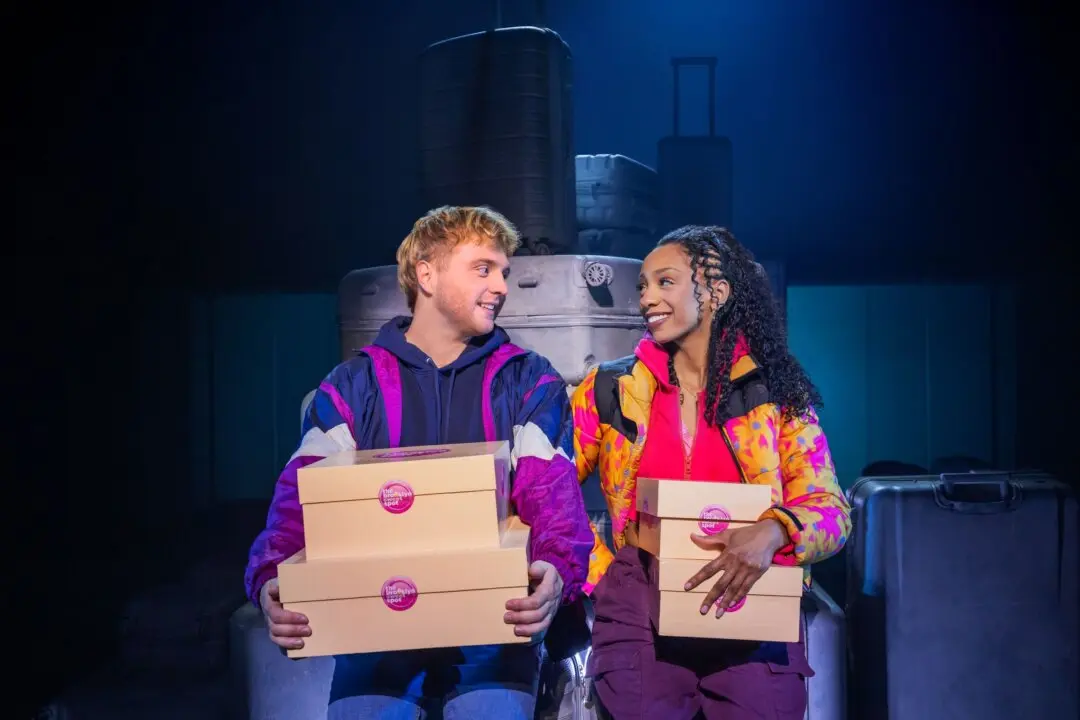NEW YORK—Combining the subtlety of a runaway freight train with the careful touch of a high wire walker performing a routine above a tank of sharks, Roald Dahl’s “Matilda The Musical” (book by Dennis Kelly, music and lyrics by Tim Minchin), has at its center a wonderful heart.
It will make all split their sides laughing, nod in rueful agreement, and cause their eyes to well up with tears—all in quick succession.
Based on Dahl’s children’s book and currently holding court at Broadway’s Shubert Theatre, “Matilda” tells the story of 5-year-old Matilda Wormwood (Oona Laurence).
Unwanted by her parents, Matilda is a special child, reading books by everyone from Dostoevsky to Dickens. She can speak Italian and Russian fluently, knows her multiplication tables almost to infinity, and has an intellect far beyond someone thrice her years.
Her attributes evoke horror and disgust in her mother (Lesli Margherita), who believes women should be all about beauty, not knowledge. Matilda’s con man father (Gabriel Ebert) doesn’t much care for her either, preferring the son he already has (Taylor Trensch).
With not much of a home life, Matilda spends much of her time at the local library, telling stories to librarian Mrs. Phelps (Karen Aldridge).
As soon as they can, Matilda’s parents send her off to Crunchem Hall, a school where any form of individuality in a child is squashed flat. The institution is run by evil headmistress and former hammer throwing champion Miss Trunchbull (Bertie Carvel).
Matilda does find a friend in the earnest and caring teacher Miss Honey (Lauren Ward).
Not so much a coming-of-age tale as one about coming to terms with the past, “Matilda” presents some valuable lessons parceled out with a satirical spoonful of sugar.
For example, the opening number concerns a gaggle of spoiled children and their fawning parents. Also, Matilda’s father believes that television is all one needs for a well-rounded education.
The success of the show is due in no small part to the person embodying the lead character, and Laurence has the prefect presence for the role. She shows a keen sense of right and wrong and has a delicious habit of revenging herself on those who are mean to her.
Laurence is also able to project such an endearing attitude that she quickly wins over the audience, not to mention the other children at Crunchem Hall. They soon regard her as their leader.
It also helps that director Matthew Warchus is able to seamlessly combine the various elements of the story. He ultimately presents a single through-line for all the material eventually tossed in—ranging from magical powers to Russian gangsters.
The musical also goes to great pains not to upset any small children in attendance, despite the work’s rather dark subject matter. This may be one of the reasons for the campy elements in the show.
This campiness is seen in the absolutely fabulous performance of Carvel, who plays the embodiment of all things frightening. Yet he also vamps to the max at almost every turn so the character quickly becomes the subject of laughter, not fear.
Also going the campy route is Ebert as Mr. Wormwood. The actor moves with a fluidity in his limbs that calls to mind Dick Van Dyke, while throwing himself into his performance with gleeful gusto.
Margherita is quite good as Mrs. Wormwood, who cuts loose with her dance teacher (Phillip Spaeth) in the song “Loud.”
Not faring as well is Aldridge as Mrs. Phelps, whose strong reactions to Matilda’s stories come across as overacting.
Ward’s Miss Honey also never really works as the role is limited by the script and feels rather one-note throughout.
The other actors in the show are all pretty much interchangeable, but they acquit themselves well.
The only place where the musical falls far short is in the delivery of the songs. Due to the orchestra playing far too loudly, it’s often impossible to hear what is being sung. In addition, the actors themselves are often miked so loudly that in group numbers, they have a tendency to drown each other out. This is a shame as the score is quite excellent, with lyrics that are heavily plot-driven and should be heard.
The set backdrop by Rob Howell calls to mind a berserk scrabble set and fits in wonderfully with the proceedings.
Choreography by Peter Darling is quite good, especially in the numbers “Miracle” and “School Song.” Lighting by Hugh Vanstone helps to add the right emotional touch. Work in the areas of orchestration and sound design, however, leave a lot to be desired.
Big, bold, and a lot of fun, “Matilda” cannot fail to touch the most heart-hardened cynic—various problems notwithstanding.
Also in the cast are John Sanders, John Arthur Greene, Sophia Gennusa, Bailey Ryon, Milly Shapiro, Ben Thompson, Samantha Sturm, Thayne Jasperson, Tamika Sonja Lawrence, Ryan Steele, Betsy Struxness, Jack Broderick, Judah Bellamy, Luke Kolbe Mannikus, Sawyer Nunes, Frenie Acoba, Erica Simone Barnett, Emma Howard, Heather Tepe, Jared Parker, Ted Wilson, Ava DeMary, Madilyn Jaz Morrow, and Beatrice Tulchin.
“Matilda the Musical”
The Shubert Theatre
225 West 44th Street
Tickets: 212-239-6200 or visit www.telecharge.com
Running Time: 2 hours, 35 minutes
Open Run
Judd Hollander is the New York correspondent for the London publication The Stage.





